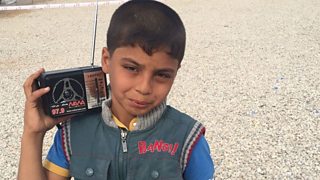Lifeline radio for displaced Iraqis
Abir Awad
Country Director for 主播大秀 Media Action, Iraq
Tagged with:
“The food we are given is not suitable for human consumption. They’ve taken away our identity cards and our phones,” says Ahmed during a phone-in programme at Radio Nawa, an independent radio station broadcasting across Iraq.
The caller is one of tens of thousands displaced from the Mosul area of northern Iraq. He’s in his own country but is not allowed to leave the UN-managed camp where he’s taken shelter; Iraqi security forces suspect anyone who has lived in Mosul during the past two years of being an IS sympathiser.
Radio Nawa and 主播大秀 Media Action worked closely with the UN refugee agency UNHCR to distribute radios to thousands of internally displaced people living in tents. This gives them access to news and information - something they lacked both in Mosul under IS and in the camps.

An Iraqi child from an IDP camp is shown listening to a radio distributed with support from UNHRC, 主播大秀 Media Action and Radio Nawa.
Radio is seen as decidedly “old” technology. Iraqis prefer social media and satellite television. But for Ahmed and many others, this is now a lifeline. So much so that the first thing he did when his father visited him was to borrow his phone and call Radio Nawa.
UNHCR calculates about 160,000 people were recently displaced in northern Iraq. This brings the total number of displaced since IS arrived to three million people. Not all are in camps. Even so the vast majority face problems with the basics of civil life; such as how to sit exams when you are registered in another province or how to get your pension when far away from your assigned pension office.
Phoning in
With 主播大秀 Media Action’s support, Radio Nawa produces a daily two-hour programme where people can phone in, raise their issues and seek an answer from one of the officials invited to join the show.
It’s not just about venting. For people in need it’s about trying to find solutions and link up the dots: families stranded in an isolated spot near the front line and in desperate need of aid, a woman from the camp in need of an urgent operation, a boy who wanted to sit his exams but was not allowed to leave the camp. The calls have prompted provincial officials to respond, many times successfully. The stranded families got help, the woman had her operation and the boy sat his exams. They all phoned back to thank Radio Nawa, including the officials themselves.
In theory, when compared to the Syrian refugee crisis, the situation in Iraq should be simpler to resolve. After all, the majority of Iraqis who fled IS are displaced within their own country. Iraq is not poor and there is a ministry that deals with migration and displacement. But the status of internally displaced people is a political hot potato.
One of the people the team from Nawa talks to when they visit the camps says his house is a kilometre away, but he’s not been allowed to return. He is not quite sure of the reasons. It’s a complicated story in keeping with a complex situation - one in which many factors come into play, including Iraq's sectarian divide and a long-standing territorial dispute between Kurds and Arabs. When IS first came to the region locals often said they were more afraid of government security forces than of IS.
Lifeline radio
A month after distributing the radios, Nawa’s team holds the first “information clinic” in the camp, bringing with them officials and microphones. It's especially valuable for those without phones and unable to make contact any other way.
It is overwhelming listening to them.
There are countless satellite TV channels in Iraq – mobile phone use is extensive and Facebook for mobile is probably the most prolific means of getting information and keeping in touch.
Yet as this latest twist in Iraq’s long and difficult journey from dictatorship and international sanctions to a shaky democracy shows, radio is once again a lifeline.
主播大秀 Media Action began working in Iraq in 2004, setting up and assisting local radio to give the community a voice and hold officials to account.
Related links
Follow us on , and
